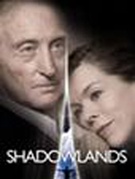Shadowlands at London's Wyndham Theatre
A Reprise of the C.S. Lewis-Joy Gresham Nuanced Love Story
By: Mark Favermann - Dec 25, 2007
Written by William Nicholson
Directed by Michael Barker-Carven
Starring Charles Dance as C.S. Lewis and Janie Dee as Joy Gresham
Performed at the Wyndham's Theatre
At Leicester Square, London
A limited engagement from October 3 to December 15, 2007
Transferring to the Novello Theatre on Dec. 21, 2007 for another limited engagement
Theatre in London always seems to feature major British actors in usually interesting roles. My recent trip was no exception. Charles Dance was reprising the role of C.S. Lewis in the William Nicholson play, "Shadowlands." Dance is one of Britain's favorite actors. He was first seen in the United States as the heroic. aristocratic sergeant in Masterpiece Theatre's "Jewel in the Crown."
Throughout his 30 year plus career, Dance has been involved with some of the most entertaining and intriguing film and television productions including Robert Altman's "Gosford Park," " Michael Collins," " White Mischief," the previously mentioned "Jewel in the Crown" and most recently the PBS presentation of "Bleak House." He also wrote and directed the acclaimed Ladies in Lavender. So, I wanted to see him act in person.
This is the first major revival of Shadowlands since it was performed in the early 1990s in London and New York. Based more or less on a factual account of the true life relationship between a bachelor Professor of Medieval and Renaissance English and an American poet/fan/mother, Joy Gresham, whom to the surprise of his brother and his colleagues, he befriended and eventually married. The story also deals with his struggle with personal pain and grief as well as his reconsideration of a deep and intellectually refined faith.
Through his writings and teaching, C. S. Lewis preached that one should endure suffering with patience, but finds that these simple answers no longer apply when Joy becomes terminally ill and eventually dies. Bleak and morbid it may sound, but the play is at once provocative and prodding in presentation. As the best theatre often does, "Shadowlands" simultaneously disturbs and enlightens while entertaining and enriching us.
Lewis, author of "The Lion, The Witch and the Wardrobe," among many books, actually did meet and fall in love with Gresham. But as screenwriter William Nicholson (who wrote the original BBC teleplay and Broadway stage play before this) emphasizes in press notes for the movie: "I have used parts of their story, not used other parts and imagined the rest."
Nicholson's original TV film starred veteran British actor Joss Ackland as Lewis, with Claire Bloom as his lover and wife Joy Gresham. It won Britain's BAFTA Awards in 1986 for Best Play and Best Actress (Bloom). This play was subsequently adapted for the stage, opening at the Queen's Theatre in London in October 1989, running until September 1990. That production, directed by Elijah Moshinsky, starred Nigel Hawthorne of "Yes, Minister" and many other wonderful roles, as Lewis with Jane Lapotaire as Joy. It won Best Play in the London Evening Standard Awards for 1990.
Nigel Hawthorne took the role of Lewis to Broadway, playing at New York's Brooks Atkinson Theatre from November, 1990 to April, 1991. Hawthorne, who co-starred in New York with Jane Alexander, won a 1991 Tony award for Best Actor, while playwright Nicholson received a nomination for Best Play.
In 1993, the play was adapted into a film of the same name directed by Richard Attenborough with a screenplay by Nicholson, co-starring Anthony Hopkins and Debra Winger, Winning Oscar nominations for both Nicholson and Winger, many thought that this was one of Sir Anthony Hopkins' best roles.
The most recent version has actor Charles Dance perhaps playing one of his most nuanced roles as well. Dance generally plays sophisticated, yet ethically troubled, or morally compromised individuals. In this role, his quite deliberately underplayed, restrained, portrayal of a man whose Christian faith is severely tested by the shock and loss of the premature death of a woman he gradually learned to deeply love. Dance adds to his speech telling, yet subtle. gestures and oral punctuations in the form of tiny snorts and slight giggles along with jangling keys in his pockets. He is emotionally and physically shaken. He captures C.S. Lewis's Oxbridge don's emotional, and often awkward, shyness elegantly.
C.S. Lewis was famous in his day as a scholar and broadcaster. Perhaps he is best known today as the author of the classic children's books. He was a confirmed bachelor into his fifties. Then, he met and married this rather remarkable American woman known for her outspoken views and acerbic wit. Their astonishing story, as written by Nicholson, has become a testament to the unpredictable nature of love with its enduring and universal legacy.
The playwright also conveys the emerging of a seemingly dormant, passionate heart as Lewis marries Joy first in a soulless civic ceremony, and then later. near her death with an almost heated religious intensity. Dance's understated performance also strongly suggests the idea that earthly life is a mere shadowland. This underscores the notion that deep religious faith offers little consolation when confronted by a painful reality of a loved one's death.
As Joy Davidman-Gresham, the Jewish born love interest, Olivier award winning actress, Janie Dee, played the role right on key. She is an accomplished British actress whose work includes seasons at both the National Theatre and the Royal Shakespeare Company as well as extensive work in the West End and many national tours. Dance and Dee were joined by other outstanding actors including John Standing, as a celibate professor, Richard Durden, as Lewis' rather rigid retired military brother, and Graham Padden as a quite self-righteous and narrow-minded cleric.
Though at times sad and emotionally draining, "Shadowlands" isn't just a multi-tissue tearjerker. This dramatized account of the relationship is more than just a manipulative narrative. On one side of Nicholson's romantic divide is a fuddy-duddy British Oxbridge professor, a devout Christian, and a celebrated writer, whose children's books were written with instinctive, rather than empirical, inspiration.
On the other side is a straight-talking, Jewish-American poet and mother who barges into his quietly ordered academic life. The two meet after initial correspondence. Gresham and her young son Douglas are fans of Lewis' writings. Gresham, escaping a bad marriage in America, arranges a teatime meeting with Lewis that is, at times, not only contentious but also mutually attracting. After she visits his home for Christmas with her son, an undefinable, unrequited passion emerges. This beautiful story is about this passion and how it evolves.
Dance says as C.S. Lewis, "Why love if losing hurts so much? I have no answers any more. Only the life I have lived. Twice in that life I've been given the choice: as a boy and as a man. The boy chose safety, the man chooses suffering. The pain now is part of the happiness then. That's the deal." This is shared with the audience with eloquence and conviction.
Though I am familiar with several of the versions of the Nicholson productions through TV and film, I found myself most interested and moved by this recent production. Others in the media seem to agree that seeing a currently produced play that deals with issues of evolving passionate love, religious conviction and human mortality is quite rare. This is true on Broadway or in London's West End. The high quality of the acting absolutely reinforced the theatrical experience as well.
The very real subject of this play is faith and doubt. This production demonstrates clearly how the protracted death of a loved one can shake to its depths the most solid Christian certainty. Love and fate are most often uncertain and unmanageable. This play was as much about the characters portrayed as it was about ourselves.


